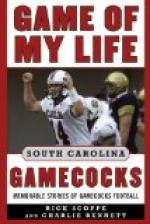I have said that most of the family from which mother came had trades of some kind; but she had to take her chance in the field with those who had to weather the storm. But my readers are not to think that those whom I have spoken of as having trades were free from punishment, for they were not; some of them had more trouble than had the field hands. At times the overseer, who was a white man, would go to the shop of the blacksmith, or carpenter, and would pick a quarrel with him, so as to get an opportunity to punish him. He would say to the negro, “Oh, ye think yourself as good as ye master, ye—” Of course he knew what the overseer was after, so he was afraid to speak; the overseer, hearing no answer, would turn to him and cry out, “ye so big ye can’t speak to me, ye—,” and then the conflict would begin, and he would give that man such a punishment as would disable him for two or three months. The merciless overseer would say to him, “Ye think because ye have a trade ye are as good as ye master, ye—; but I will show ye that ye are nothing but a nigger.”
I said that my father had two wives and fifteen children: four boys and three girls by the first, and six boys and two girls by the second wife. Of course he did not marry his wives as they do now, as it was not allowed among the slaves, but he took them as his wives by mutual agreement. He had my mother after the death of his first wife. I am the third son of his second wife.
My readers would very naturally like to know whether some of the slaves did not have more than one woman. I answer, they had; for as they had no law to bind them to one woman, they could have as many as they pleased by mutual agreement. But notwithstanding, they had a sense of the moral law, for many of them felt that it was right to have but one woman; they had different opinions about plurality of wives, as have the most educated and refined among the whites.
I met one of my fellow negroes one day, who lived next neighbor to us, and I said to him, “Well, Uncle William, how are you, to-day?” His answer was “Thank God, my son, I have two wives now, and must try and make out with them until I get some more.” But while you will find many like him, others would rebuke the idea of having more than one wife. But, thanks be to God, the day has come when no one need to plead ignorance, for master and servant are both bound by the same law.
I did not go to the sand-hill, or summer seat, my alloted time, but stopped on the plantation with father, as I said that he used to take care of horses and mules. I was around with him in the barn yard when but a very small boy; of course that gave me an early relish for the occupation of hostler, and I soon made known my preference to Col. Singleton, who was a sportsman, and an owner of fine horses. And, although I was too small to work, the Colonel granted my request; hence I was allowed to be numbered among those who took care of the fine horses, and learned to ride. But I soon found that my new occupation demanded a little more than I cared for.




